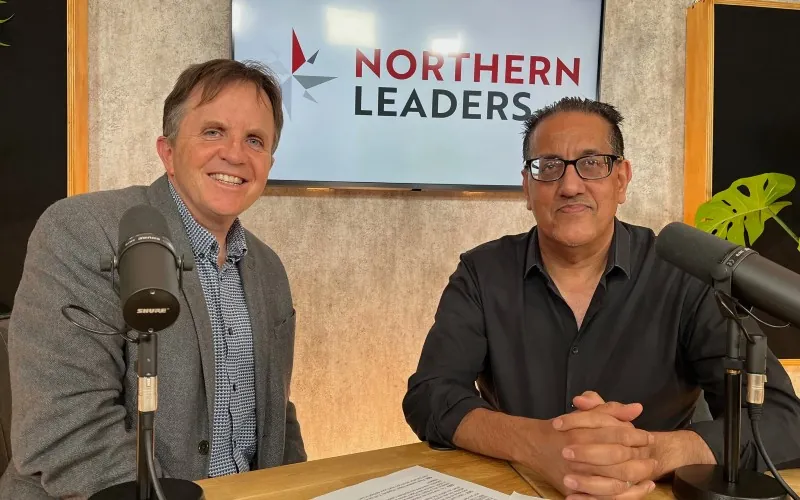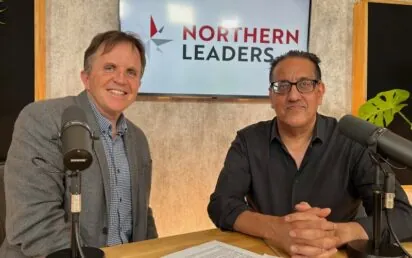In one way or another, Nazir Afzal OBE has spent most of his life fighting.
His childhood was marked with standing up to racist bullies and confronting tragedy, while his legal career saw him target some of the UK’s most notorious criminals.
Now in his 60s and the Chancellor of the University of Manchester, he continues to speak out on behalf of those people who don’t have a voice and was included in BusinessCloud’s 2024 Northern Leaders list.
He’s the first guest on BusinessCloud’s new Northern Leaders podcast, which has been sponsored by Wildbrook Commercial Real Estate.
You can listen to the podcast on Spotify; on Apple Podcasts; or watch the interview on YouTube below.
In a far-ranging interview he talks about some of his most high-profile cases including prosecuting police killer Dale Cregan, the Rochdale grooming gang and disgraced BBC presenter Stuart Hall.
His fearless pursuit of justice saw him targeted at his home by Far Right thugs – but he refused to be cowed.
Afzal has a reputation for being a brilliant communicator, evidenced by the simplicity of his answer to the opening question: What does the North mean to you?
“I was born in Birmingham, nurtured professionally in London, but I was made in Manchester,” he said. “Manchester’s home.”
Afzal grew up in Birmingham and revealed how he often didn’t feel safe beyond his front door.
When he was 13 he was attacked as he walked home from school and was only saved from serious injury when a taxi driver intervened – although he often didn’t tell his parents what was happening.
“I didn’t want them to know that we were suffering because they’d suffered enough to get us here,” he said.
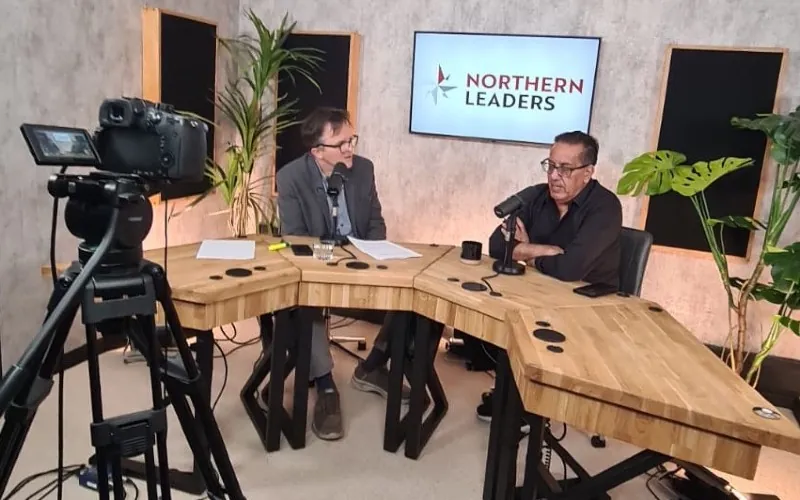
Nazir Afzal and Chris Maguire on the Northern Leaders podcast
His father worked for the British Army and his uncle was killed by the IRA in The Troubles in 1974.
“One of my uncles was with a younger member of my family and was grabbed by what we know to be the IRA in the back of a van,” he recalled.
“In front of the younger member of my family, he was shot in the face, and the younger member was told: ‘Go and tell the boss (my father) to get out of Northern Ireland.’ My father stayed another 10 years.
“My parents made me what I am 100% and you know, I take my resilience from them, I take my courage, I take my need to do the right thing from them.”
For a man who has experienced racism most of his life, Afzal appreciates the irony that he used to laugh at TV shows like Benny Hill, which were subsequently criticised for some of their racist and sexist jokes.
“I’m wincing when I’m listening to the language that’s been used in those programmes – we call it ‘brown face’ or ‘black face’ now, don’t we,” he said.
“Spike Milligan, great comedian that he was, was dressed up as an Indian. It was of its time. Even more bizarrely my father and I would be sat there watching and laughing.”
An event that shaped Afzal’s philosophy was a trip to Pakistan with his parents when he was eight.
“I was born in this country, and my three younger siblings were born in this country, and my father and mother decided it was a great opportunity for us to spend some time in northern Pakistan and understand where they came from,” he said.
“We went in a Transit van. It was best part of three weeks. Yugoslavia, Iran and Afghanistan were all open so we got to northern Pakistan.
“I was eight and my cousin Yasmin was eight. We had a great time. We spent four or five months in Pakistan and then we had the three-week journey back.
“As we were travelling through Europe, my eight-year-old cousin got sick. As we entered Belgium she died. We had to get the ferry from Ostend.
“My mother put her in my arms and said ‘she’s sleeping, look after her’. For the four-hour ferry ride across the Channel, she’s in my arms.
“When we got to Dover they reported it to the authorities and she was taken from me. She died from dehydration which, these days, we can deal with with a pill or two.
“Back then we didn’t have Google so they didn’t know how seriously ill she was. I realised then nobody else was going to die in my arms. Literally, I was not going to allow this to happen. Whatever I could do to prevent harm is what I was going to do.”
Afzal told the Northern Leaders podcast how he came to choose a career in law.
“Initially I didn’t have any role models,” he recalled. “Back then the only lawyer I knew was Perry Mason on TV! Back then, children of immigrants were told you had to be a doctor or a scientist or an engineer… I wanted to do law because if I had any role models, and I did have role models, they were people who were lawyers who’d achieved something.
“Who were they? I remember having this conversation with Dad and he asked me who they were. I said, ‘Atticus Finch, Mahatma Gandhi and Nelson Mandela’. My Dad replied: ‘One’s fictional, one was murdered, and the third is currently in prison’. I said, ‘yep, those are my role models Dad’. I realised law was a means of changing things for the better.”
The budding lawyer left Birmingham and went to London, working as a junior prosecutor during the day and as a DJ in the evening – often surviving on three hours’ sleep.
“I loved it,” he explained. “I was doing jungle and house and garage and, you know, all that sort of stuff. I lived three doors away from Soul II Soul.”
In 2001, just months after 9/11, Afzal became the youngest person and first Muslim to hold the role of assistant chief crown prosecutor.
“I’ve been surrounded by some good leaders,” he said. “One of them was a guy called David Calvert-Smith. He was the director of public prosecutions (from 1998-2003) and for him to appoint me three months after 9/11, you can imagine how courageous it was of him.
“What I’d done was I had actively sought the more difficult cases – that’s why I had made my reputation back then. I’d actively worked on the horrible stuff (like) serial killers and paedophiles.
“I think it is what set me up to be able to do that role. I saw it as an opportunity where I could build really good teams that would focus on the day-to-day and enable me to focus on the things that we weren’t so good at, and reach out to the public. That’s what I chose to do.”
The case of Fiona Pilkington, who killed herself and her severely disabled daughter in 2007 after being harassed by local youths, had a profound impact on Afzal.
“It taught me we, as authorities, were interested in process rather than thinking about the impact on that person,” he said. “What Fiona and her child were experiencing was that they were prisoners in their own home. The police were saying ‘it’s just some eggs being thrown at you’, not realising the phenomenal impact it was having on them.
“I learned very early on: start by looking at things through impact, and start by listening to victims.”
Afzal said ultimately victims needed to be listened to.
“Listening is the skill that we do not value enough,” he said. “The experts in antisocial behaviour, the experts in stalking, the experts in violence against women are the women and the people who are most impacted by these crimes – they will tell you what went wrong. They will tell you what needs to be done to fix it. And as leaders, we need to be listening to them and then acting upon what we’ve heard.
“The mantra has been for about 20 years: ‘victims at the centre of the criminal justice system’. There’s a word for that. It’s rubbish. That does not exist. The justice system talks the talk, but it doesn’t walk the walk.”
In 2011 Afzal was promoted to chief crown prosecutor for the North West of England in 2011 and a year later found himself at the centre of one of the UK’s most infamous murder cases.
Prosecuting Dale Cregan
Dale Cregan killed four people, including police officers Fiona Bone and Nicola Hughes, and Afzal authorised his prosecution.
Afzal also took the unusual decision to hold a joint press conference with Peter Fahy, chief constable of Greater Manchester Police.
“The media were surprised,” he said. “The public were interested, and therefore you should be out there transparently, telling the public what you were doing and why you’re doing it.
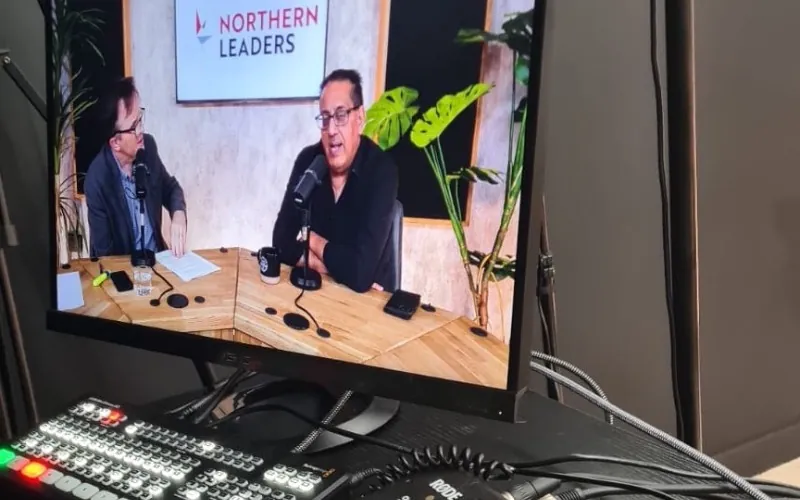
Nazir Afzal on the Northern Leaders podcast
“It was also about reassurance. People were scared, even if the murderer was in custody and facing trial; people were scared that anybody could be harmed.
“He (Cregan) will die in prison. He’s been given a whole life order.”
One of the biggest decisions Afzal made as chief crown prosecutor was to overturn a decision that had been made by the CPS to authorise prosecutions in the case of the Rochdale child sex abuse gang.
The case was turned into a BBC drama called Three Girls.
Afzal said: “The girl walks into a takeaway restaurant in 2008, she starts smashing it up, police officers attend. She’s arrested. She then discloses that she’d been raped by the two men in that venue. The police then carry out a really poor investigation, where actually they just investigate her and her credibility.
“She had low-level criminality. She was from a very troubled background. They investigated her. They didn’t really bother investigating the perpetrators, but that was the case with all sexual abuse unfortunately.
“They were more concerned about whether the victim was credible. Anyway, (at) the end of that nine/ten month investigation the officers formed a view that she wasn’t credible, that there was no point prosecuting those men.
“They went to prosecutors, both of whom were white, and both of them hearing what the officer had to say about her credibility, came to the same view that there’s no point bothering prosecuting. That was in 2009, I move up here in 2011.
“When you don’t hold people to account, others feel they can act with impunity. By the time 2011 had happened there were now nine men and up to 47 girl victims because the police had not acted for those two years.”
Afzal said the powers that be had to accept their previous decision was wrong before they could move forward with a successful prosecution.
“Those men were ultimately prosecuted,” said Afzal. “There was a four-month trial in Liverpool Crown Court, and they were ultimately convicted in May 2012.”
The lawyer said the high-profile case meant the world finally woke to the sexual abuse of children.
“People were also just focusing on street grooming of the type that we’d seen there in Rochdale, and nobody else wanted to put their head above the parapet,” he said.
“It ended up with me doing articles and media and all that to explain to people the ethnicity of the perpetrators was an issue, but the issue was that these girls, and thousands of girls like that, had just not been listened to for all manner of reasons, including political correctness, but mainly incompetence.
“To put it bluntly two thirds of all sexual abuse of children happens in the family. The next largest group of victims are online. Right now, for pennies, you can watch a child being sexually abused.
“The third largest group are institutional sexual abuse victims – so victims in places of worship, schools, colleges.
“Street grooming, whilst it’s a massive issue, it’s actually the smallest number of victims compared to all the others, but we had not paid attention to this issue.
“We’d been saying to children for decades, ‘you should be seen and not be heard’. What a surprise now that we were hearing them and what they had to say.
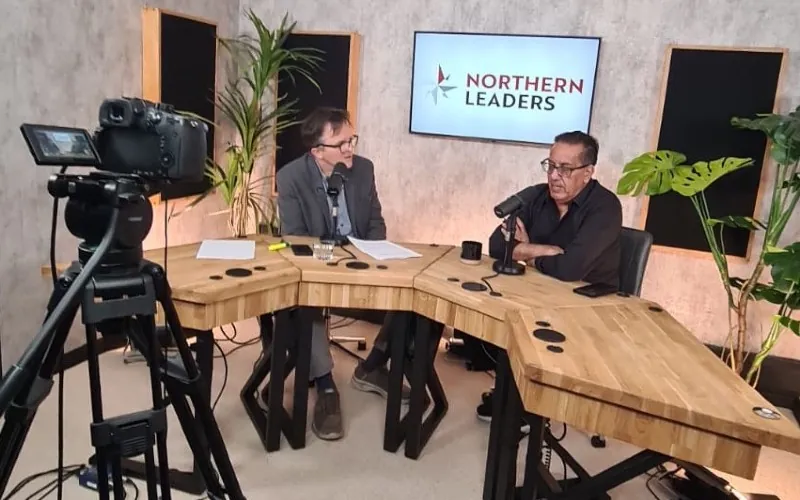
Nazir Afzal being interviewed on BusinessCloud’s Northern Leaders podcast
“I had a lot of phone calls from Prime Minister David Cameron and my name was being mentioned in the House of Parliament.
“We were now going to move with vigour and robustness in tackling these crimes and then something even more strange happened.”
Far Right
Afzal, a devoted father, suddenly found himself targeted by the Far Right.
“The British National Party realised that I had damaged their narrative because their narrative was straightforward – all brown men are the rapists,” he said.
“When it was being public knowledge, the only reason these brown men were before the court was because of a brown man: they didn’t like that, so they put out some fake news on their websites saying that I had been the one in 2008/09 that hadn’t prosecuted these guys, given that I never lived in here until 2011 anyway.
“Unfortunately, their followers believed that. Suddenly I had Far Right thugs trying to break into my house. I had to have panic alarms placed in every room.
“I taught my kids, my youngest was nine at the time, how to use a panic alarm. My kids could only go to school in a taxi for four months, because that was the security advice I was given.
“I had a police officer stationed outside of my front door. I had to tell my kids ‘the Prime Minister’s got a police officer outside his door’ it was the only way I could provide reassurance. And yet, I was getting all of this despite being the one person that got everything right.

“I couldn’t talk publicly and show people that not only was I scared, more importantly, I was worried for my family. My wife was suffering.
“These were the early days of social media and they were reading stuff online and thinking, ‘why are they saying this about our Dad?’
“I was more worried about the impact on them, but I couldn’t show this publicly.”
Afzal told the Northern Leaders podcast that he might have resigned but for the support of his colleagues at the CPS.
“I still remember my PA running down the corridor with a letter that contained faeces, saying, ‘don’t tell him, don’t tell him’,” he recalled. “They kept the worst excesses from me.
“Another reason [I survived] was my boss. I didn’t know this at the time but my boss told my staff, ‘Nazir must not have any meetings between 9am-10am and 3pm- 4pm because he needs to be available to do the school run. Nazir will not be invited to any overnight conferences, any conferences or meetings in London that require him to have an overnight stay because he needs to be at home to be able to protect his family’. I didn’t know why I was not being invited to meetings for several weeks.
“We leaders don’t ask for help. I would not have asked for that help. He (my boss) realised that I needed that help. You know this guy: his name is Keir Starmer. He actually made sure that I was safe and secure and contented, even when I did not want to know that’s what I needed.
“The third group of people that made me get through that phase were victims, because finally, they were being heard. We went very quickly from being pretty poor at tackling sexual abuse of children to by 2015 we had the highest conviction rate for child sexual abuse in British history.”
Afzal went on to become the chair of Hopwood Hall College in Rochdale for six years.
“I didn’t take that on because I wanted to give something back to Rochdale,” he said. “I wanted to give something back to children. That’s why I took it on.”
In May 2013, Afzal was involved in the prosecution of former BBC presenter Stuart Hall for multiple sex offences against girls and young women.
“12 women accused Stuart Hall of sexual abuse going back three decades, and he ultimately was convicted,” he said.
“Some people may remember at one of the earlier hearings, he was outside of Preston Magistrates’ Court saying he will be vindicated, and all of this is lies, etc.
“Ultimately, he pleaded guilty to the abuse of 11 women, and he was found not guilty of the abuse of one woman. I remember going to see that woman in the aftermath of the trial, and saying to her, ‘I’m really sorry I couldn’t give you closure’.
‘You gave me closure the moment you believed me’
“She looked me in the eyes and say ‘you gave me closure the moment you believed me’. That was a real moment for me because I realised, like everybody else, I was fixated on process, arrest, charge, conviction, sentence.
“Actually, what most victims want is just to be heard. The only reason why the law matters is because it should be that nobody’s above the law.”
Afzal left the CPS in 2015 but has continued to be contacted by the victims of crime.
“I have a website that I haven’t updated for a long time but it has a contact page,” he said. “Even this morning, I got an email from somebody saying, ‘X raped me, should I report it to police?’
“My answer all the time is ‘yes’. But anyway, I got this email a couple of years ago from a woman, and it said this: ‘Dear Mr Afzal, you won’t remember me. I was one of the victims of Stuart Hall. I now have terminal cancer. I only have a few weeks to live, but I wanted you to know that my life began when you believed me’.
“I sent her my phone number. She explained to me that for 30-odd years since the abuse had happened, she’d been blamed for everything: her family didn’t believe her, her friends didn’t believe her. If they did believe her, they said it was her that caused it in some way, shape or form.
“Her whole life had been a complete and utter trauma, and then suddenly she was heard, suddenly she was believed, suddenly she got justice.
“For the last 10 years of her life, she was able to have a life that was worth living. And here she was at the end of her life, wanting to tell me that I changed her life for the better, and I went to her funeral a few weeks later.
“I was at this funeral wondering: ‘why am I here?’ I realised why I was there. I was there because she had told me that I changed her life for the better. I wanted her to know that she had changed my life for the better.”
Afzal has continued to use his voice to speak out on a range of issues, including violence against women and honour killings. He became an outspoken critic of the government’s cuts to the CPS and the Ministry of Justice.
Manchester Arena bombing
In 2017 he resigned as chief executive of the Association of Police and Crime Commissioners (APCC) after the Manchester Arena bombing because he wanted to express his views on BBC Question Time.
“The terrible crime happened on the evening of May 22nd,” he recalled. “The next day, I went into my offices and told them: ‘I need to say something and I need to talk about it publicly’.
“They said: ‘No, you can’t’. I said: ‘Well, fine, here’s my resignation’. I remember walking out of that office having just drafted a letter that minute and handing it in and getting on the train back up to Manchester.
“Straight away, I was doing interviews – not just for Question Time – to reassure people, but also to put some perspective around this criminal, this terrible criminal, who had done this terrible crime to the people of Manchester, to children.
“Often missed is the attack was deliberately aimed at a group of women and girls. You know, Ariana Grande has a predominantly women and girls’ audience, and that’s what we’re dealing with.
“To my mind, quitting a job and not having money coming in next month is the smallest price to pay. And I’m glad I did.
“Public confidence doesn’t come from press releases. You know, too many organisations will issue a press release, and that’s it. You need to be out there.”
Asked what he hoped his epitaph would be, Afzal said: “I hope my epitaph is that I’ve just listened, and I continue to listen, and then when I’ve heard something that needs to change, I try and change it.”
You can listen to the Northern Leaders podcast on Spotify; on Apple Podcasts; or on YouTube.
